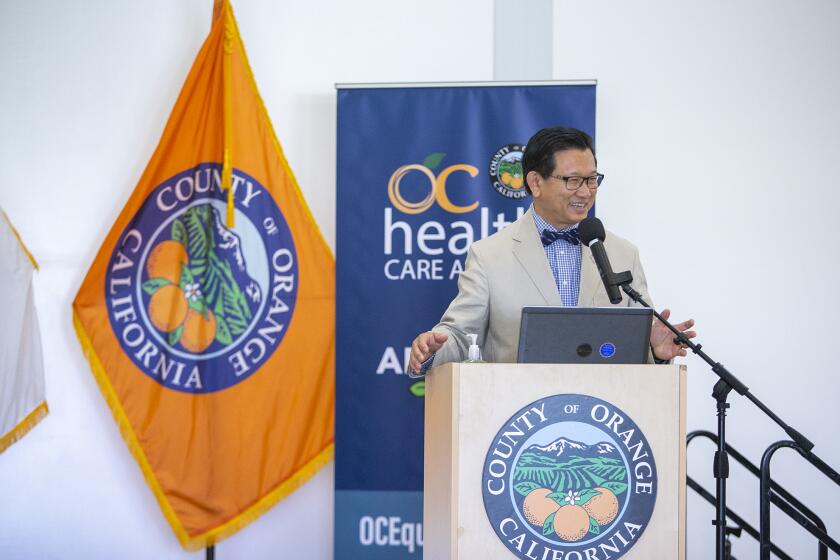At 76, this semi-retired orthopedic surgeon is still competing in international judo tournaments
Dr. Steve Hwang doesn’t usually perform judo throws on 6-year-olds.
At Bunasawa-Kai Judo Dojo, a martial arts school housed in Costa Mesa’s Higashi Honganji Buddhist Temple, there are two classes on Tuesday and Friday evenings — one for kids and teens, followed by one for adults.
On a recent Friday, as one class transitioned to the other, head instructor Nori Bunasawa (the youngest grandmaster in the U.S. to achieve the red belt and ninth Dan rank) joked that Hwang, the oldest member of the dojo, should practice with Ryota Jibu, the youngest.
Hwang, 76, gamely let Ryota throw him onto the ground. Then, he gently flipped Ryota onto his back. In Japanese, judo translates to “gentle way.”
Fighting Hwang was a “wish come true,” Ryota says in Japanese.
When asked if it ever hurt to be thrown on his back, especially now that he’s in his 70s, Hwang shrugs.
“I’ve been thrown on my back my entire life,” he says. “It’s normal.”
Earlier this year, the Tustin-based orthopedic surgeon semi-retired from his medical practice, but the fifth-degree black belt has no plans to retire from competitive judo.
In fact, as he’s gotten older, he’s become more active. He started running marathons in his late 50s and has now completed over 200. Though he’s been competing in judo since he was in medical school in Taiwan, he didn’t start competing in international tournaments until he was in his 70s.
In the last five years, Hwang has won three bronze medals at the World Judo Championships. Last year, the USA Judo organization ranked him the No. 1 national veterans athlete in his age and division. He next plans to compete in June at the 2019 USA Judo Senior National Championships in Las Vegas.

Hwang says that he’s always had a “fighting spirit.”
Born in Japan to Taiwanese parents, Hwang’s parents told him that when he was a toddler they accidentally lost him and he found his way back home.
During World War II, his family made a detour to Manchuria before taking a refugee boat back to Taiwan in 1946. More turmoil awaited them in their homeland, including the infamous Feb. 28 incident, where thousands died, and in 1949, the beginning of 38 years of martial law. That time period is commonly referred to as the “White Terror,” because around 140,000 were imprisoned and several thousand were executed by the government.
Hwang, a practicing orthopedic surgeon in his 20s, moved to New York in 1971. However, because the United States requires foreign-trained doctors to go through residency again in order to practice, he had to retrain.
“Training for surgery usually only takes three or four years [before you can start working], but it took me more because it was very difficult to get a position,” says Hwang. “It was very competitive, even for Americans, and at the time, there was discrimination against foreigners.”
People didn’t always treat him with respect, he says.
“I’m small, I’m not aggressive, and when I first came, I’m kind of shy, so I don’t want to talk,” says Hwang, pointing to American stereotypes of Asians as meek, mild-mannered and quiet. “They think I don’t know anything. Everyone wants to take advantage of you.”
One day, after he relocated to Orange County in 1977, his chief resident was bullying him, and Hwang pulled out some judo moves.
“I tried to throw him,” says Hwang, laughing. “He backed off. And then he was pretty nice to me after that.”
Tsubasa Goya, who practices with Hwang at the Costa Mesa dojo, points to the Japanese proverb: “A skilled hawk hides its talons.”
“That’s an Asian thing, to hide your claws,” he says. “Here though, you have to show off what you have.”
Tsubasa, who emigrated from Okinawa to Orange County in 2008, says that in Japan judo is both a physical sport and mental practice that teaches discipline and confidence.
However, even in Japan, it’s rare for elders to compete in the sport.
“Seeing [Hwang] and others still competing is very inspirational,” says Tsubasa, 33. “My goal is to be world champion before I die. It doesn’t matter if you become world champion in your 20s, 30s or 50s. You are the world champion. So I have time.”
Nowadays, Hwang attends national and international tournaments a few times a year, but he rarely competes locally as there are few opponents in his age and weight classes.
“We’re all getting older, but he’s like the Energizer Bunny,” says Dr. Ken Vanderlip, a psychologist who’s been Bunasawa’s judo assistant since the mid-1970s. “At the tournaments he’s going to, everyone’s somewhere in the black belt range. As you get higher in age, there are fewer and fewer competitors but the ones that are competing are usually pretty good.”
Hwang says he just competes for fun. That said, when he’s mid-fight, he wants to win.
“If I don’t have that fighting spirit, I probably could not be successful in America,” says Hwang. “You have to struggle and lose many, many, many times before you win. The good thing about judo is if you lose, it’s OK, You can come back another time. Just keep going, keep fighting, and you’ll never fail.”
Support our coverage by becoming a digital subscriber.
For more news and features about Orange County, visit TimesOC.com or follow us on Twitter @timesocofficial.
All the latest on Orange County from Orange County.
Get our free TimesOC newsletter.
You may occasionally receive promotional content from the Daily Pilot.




